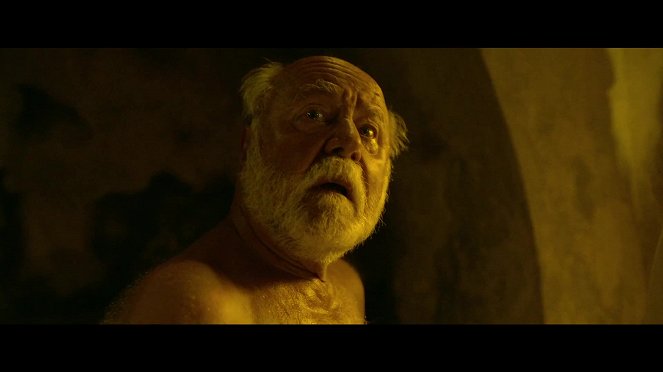Ohjaus:
Kornél MundruczóKuvaus:
Marcell RévSävellys:
Jed KurzelNäyttelijät:
Merab Ninidze, Zsombor Jéger, György Cserhalmi, Móni Balsai, Sándor Terhes, Zsolt Nagy, Majd Asmi, Zsombor Barna, Szabolcs Bede Fazekas, Ákos Birkás (lisää)Suoratoistopalvelut (1)
Juonikuvaukset(1)
Aryan (Zsombor Jégeron) on syyrialaispakolainen, joka pyrkii Serbiasta rajan yli Unkariin. Aryanin kanssa rajan yli yrittävät hänen isänsä ja joukko muita särjettyjä sieluja. Rajalla heidät otetaan kiinni. Aryan haavoittuu ammuskelussa, ja huomaa hämmästyksekseen voivansa lentää niin halutessaan. (Future film)
Arvostelut (5)
A Hungarian Inception about a doctor with pangs of consciousness, a bad, refugee-hating cop and a
young, immortal refugee from Syria who can fly. Jupiter’s Moon is no art film and it’s just as stupid as
it sounds. And it includes one epic, one-shot car chase through Budapest in the morning. This movie
is a genre hybrid with an ambitious form but failing both in terms of conveying emotions and telling a
coherent story, which won’t be understood in its entirety either by teenagers interested in action
and special effects, or even by philosophers reveling in existential issues. The director obviously
wants to go to festivals and Hollywood, but as far as I’m concerned, he might as well sell Hungarian
goulash at a street-side stand.
()
Jupiter’s Moon is a major surprise, primarily because a person from Eastern Europe definitely would not expect a film of such rank. The film is not a committed festival darling as the premise may suggest, but rather has the most in common with the ambitious Hollywood overground. It unavoidably brings to mind Children of Men, with which its Hungarian equivalent shares not only plot motifs, but also a formal sweep and breathtaking production. With the aid of brilliantly conceived long shots with complicated camera movements and epic mise-en-scène, Mundruczó, like Cuarón, creates a pulsating image of the world, which serves as an attractive realistic framework for the fantastic plot. Both films tell variations of archetypal stories, but while the American project helps the archetype gain new emotionality and urgency, the Hungarian film brings a degree of morality with social and religious levels to the formula of a “Hollywood” story of awakening and salvation. Another analogy is Luc Besson’s work in the 1990s, which Jupiter’s Moon evokes primarily with its colour palette and overall style. However, whereas Besson placed genre-specific characters in outlandish non-genre-specific environments and situations, Mundruczó puts flawed, doubtful and egocentric non-genre-specific protagonists into larger-than-life genre-specific situations. Concurrently, when considering the context of the Hungarian reality with real refugees at the border and a polarised society, it is not easy to determine where Jupiter’s Moon falls on the scale of commercial art. However, it unambiguously provides overwhelming proof of the vitality of Hungarian cinema. If in previous years Czech criticism used it as a contrast for taking the measure of Czech production, it is now proving to be something completely unattainable for both local filmmakers and institutions. Jupiter’s Moon is an engaging spectacle that addresses the themes of its own festival-film production. With its sweeping nature, it also liberates the reality of refugees from the usual understanding offered by the media and brings forth a devastating catharsis of its incomprehensible monstrousness.
()
Technically, Jupiter's Moon is an absolute win. It is excellently crafted, with a perfect camera and artistic stylization, combining 70s American crime films and modern science fiction ala Chronicle, Children of Men and Inception, but it is always a film from a Hungarian perspective. However, the great introduction consisting of a raid on illegal immigrants, several excellent action/escape scenes and a remarkable theme, fail to obscure the incompleteness of the story, which goes in circles and has ill-conceived twists, and the initiated social commentary on the refugee crisis mixes with religious analogies somewhat unnecessarily. Even so, this is another example of how much Hungarian cinematography has been on the rise in recent years.
()
It's fascinating how many people can't find an excellent story unless a film explicitly tells them that it's telling one. In Jupiter's Moon there are dozens of suggestions and ideas in virtually every one of its long, incredibly composed takes. Yet nothing in it begs for your sympathy, the characters are confused, jaded, corrupt, and selfish, the refugee issue is not viewed in a purely one-sided way (we even get a terrorist attack), and it doesn't give answers. Only a vision of a torn, sodden continent, devoid of miracles, whose weakness has been exposed by the influx of convinced, head-high refugees fleeing destruction. I would have expected something this wild and radical from a 25-year-old director. Last year with Poland's The Last Family, this year with Hungary's Jupiter’s Moon, the Czech Republic really should hand in its filmmaking pass for the next ten years.
()
I must say I got a little lost in this film. I didn’t find the main character relatable. Plus, I didn't get what the filmmakers were trying to tell me. The three stars are for the sometimes almost stunning visuals, but the writing left a lot to be desired as far as I’m concerned. Also, I'm still wondering how the rotation of the apartment was supposed to work...
()

